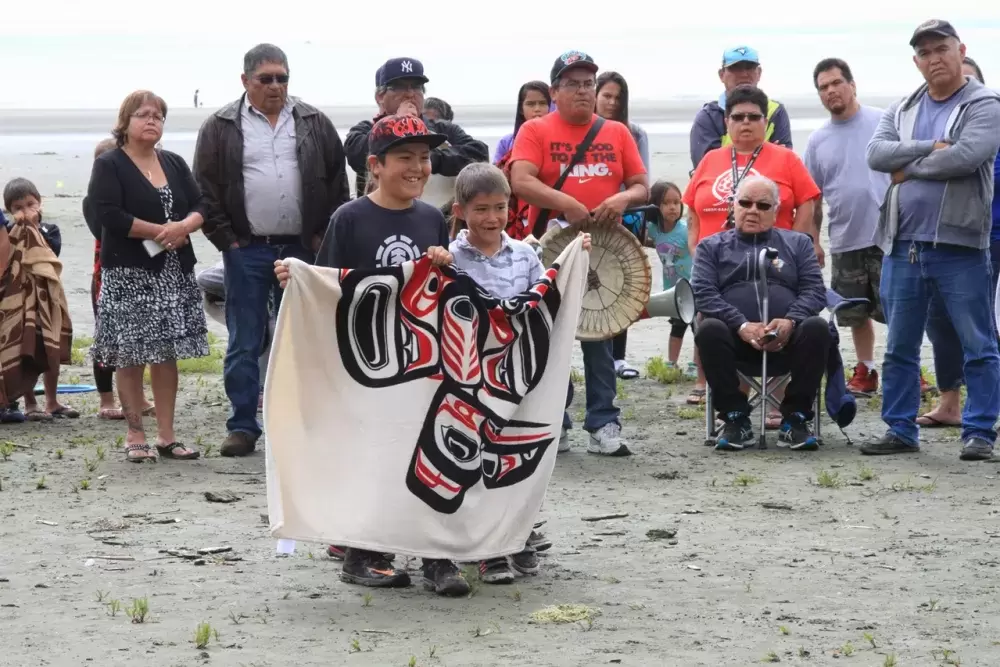The children of the Tla-o-qui-aht First Nation gently wrapped blankets around the shoulders of their young cousins who were being welcomed home on Aug. 10.
Tla-o-qui-aht Ha’wiih, elected leaders and community members had greeted the children on the beach at Esowista. The children are living in the care of foster families, most a long way from their homeland.
The children were introduced to their family members and celebrated. The homecoming let the 22 children who were present know which houses or family groups they belonged to, and provided them with information about their family roots.
It was overwhelming and emotional, said Marie Frank Atleo, the Family Care Support Worker with the Nation. The children came from as far away as Vancouver and Victoria. She was proud to say that the nation had managed to keep seven of the approximately 30 kids in care at home in the community with family. Marie said the nation is actively working to get the others home.
“This is important so that our children don’t lose their identity,” said Marie.
She said the homecoming was about grounding the kids and providing them with stature, giving them a feeling of being first nation and from a homeland.
It’s a tribute to the success of the Tla-o-qui-aht protocol with Umsa Nuu-chah-nulth, the Nuu-chah-nulth Tribal Council’s child and family services department.
Whenever there is word that a child or children are at risk of going into care, the Tla-o-qui-aht First Nation is notified and given a chance to work with the parents and extended family of those children to prevent it. They help the parents of the children understand the severity of having their children removed from their legal care, and to help them find ways to avoid that.
“It’s so powerful, when I have a family meeting, when I have an elder there,” said Marie. “So having our elders and the heads of the family involved has a really huge impact on us helping our children stay at home.”
One of the greatest challenges is there are very few homes on the west coast of Vancouver Island for the placement of children, so they have to be sent away. More homes, and more family involvement, is what is needed to step up to assist.
Tla-o-qui-aht was one of the first Nuu-chah-nulth nations to sign such a protocol, with other Nuu-chah-nulth nations to follow. A similar protocol was signed with the Surrounded by Cedar child protection agency in Victoria, which is obliged to ensure that Usma is notified when a Nuu-chah-nulth child is taken into care there.
The honoring began with a chant by elder Barney Williams as the children were led down to the beach. They stood facing the Ha’wiih (hereditary chiefs) as the community looked on.
“We’re here to celebrate a homecoming,” Williams said. “To introduce you to families. To welcome you on behalf of the chiefs… to say how happy they are to see you here today to reconnect with family. Family is important. You need to know who you are, where you come from, always as you grow up. On behalf of the chiefs, the muschim, the people of this land, and your family, we say welcome.”
Ha’wilth Bruce Frank said the event that day was “really exciting to see.” He introduced the other Ha’wiih or their representatives to the children.
The children were then called forward.
One boy was concerned. 'Why?' he asked the lady he was with. He stepped forward anyway, and then he met his Grandpa.
The kids were approached by smiling children from the community and blanketed. Some of the elders also wrapped the children. Bruce Frank said the comfort of that blanket was to welcome them. “We don’t want you to ever, ever forget the root that you came from.”
Francis Frank put out a challenge to Usma Nuu-chah-nulth, referring to the Tla-o-qui-aht/Usma protocol. He said the nation didn’t want to have such a day to happen again, because “we want our children all in our care. Our children should be with our houses. We’ll do our best to do our part to change the direction that’s happened over the years so that our children don’t end up in care,” he told the Usma representatives in attendance, including the Director of Usma Kyra Mason. He told Usma that the nation appreciates all that the organization will do in the meantime until the community reaches that place.
Nuu-chah-nulth Tribal Council President Debra Foxcroft responded on behalf of Usma, saying she was honored and happy to be in the community at the event.
It’s really an emotional event for me,” she said. Foxcroft worked in the Usma program in its beginnings, helping to develop it. She said the connection made by the children to their families had always been the dream and the vision of the Usma program.
She said she knew that the ancestors were watching over the children that day. She said that all agree what is needed is to prevent the children from going into care in the first place.
“It has always been our vision and our goal. To do that we need to strengthen families and communities to be able to do that in a good way.”
The children were then gathered around the singers and the Victory Song was sung.
It’s a victory to have the kids come back,” Barney Williams told Ha-Shilth-Sa. He said the day was very emotional for him. And it wasn’t just about coming home. He said the energy of the ancestors would connect with the children in some way.







